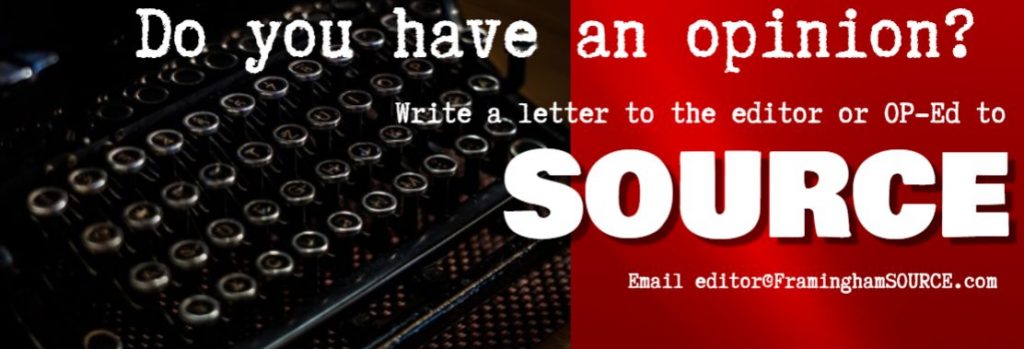By Adam Freudberg & Geoffrey Epstein
***

FRAMINGHAM – The Mayor and the Chief Financial Officer (CFO) recently proposed cutting $800,000 from the school district budget to partially and temporarily fix a chronic problem with the city water & sewer operation.
This amounts to a reduction in vital Chapter 70 state aid for the schools and does not recognize the immense challenge and soaring costs occurring right here, right now in the school system during this pandemic. That aid is explicitly designated for special needs students, students with limited English proficiency, and low income students, and it is quite clear that this group of students have been the most adversely affected by the pandemic.
To reduce their support seems highly ill advised.
The $800K, if taken from the schools, would literally be the second sizeable chunk of money snipped out of the school district’s latest Chapter 70 aid. The first was a chunk of $653,543 in late summer. Back then, when the state came up with around $3 million in additional late breaking and unexpected Chapter 70 funds for Framingham schools, the Mayor/CFO were initially thinking of taking all or half of it for cityside use.
On August 18, there was a good collaborative discussion in a meeting with the Mayor, CFO, City Council Chair and Finance Subcommittee Chair, the Superintendent, the Finance Director, School Committee Chair and Finance Subcommittee Chair: The Group of 8.
[broadstreet zone=”53230″]
After discussing options and tradeoffs, the Mayor decided that $653,453 of Chapter 70 funds would be used to pay cityside health insurance expenses, originating in the schools. The City always pays all these health insurance costs, so the offer was that this would be a one-time fix, taken out of the school district FY21 budget, and would be restored to the schools in the FY22 budget. That way the schools would not be on the hook for recurring health insurance expenses, which is an explicit cityside responsibility.
That was collaborative, and a reasonable result, with the school district offering its help to mitigate City budget problems for a year.
This latest $800,000 grab broke all the prior collaboration and financial rules.
The Group of 8 did not convene.
[broadstreet zone=”59947″]
No one was asked for feedback on the specific impact this would have on the school district, prior to the Mayor/CFO going public with their water and sewer bail out. Worse still, is the fact that water and sewer management have nothing to do with the schools, unlike health insurance, and that they have no intention for this to be a one year take from the schools FY21 budget, with restoration in the FY22 budget.
Further, in the Council meetings on December 8, the Mayor and CFO argued that the proposed $800,000 cut to the schools FY21 budget would not impact education, and that there was plenty of money to spare in the school district budget due to transportation savings and COVID-19 money.
Nothing could be further from the truth.
If collaboration had been pursued, and the Group of 8 had met to discuss the water and sewer financial crisis, it would have been made quite clear from the Council end of the Zoom meeting that the water and sewer money problem had some degree of complication and was not going to be fixed by this band aid approach. The problem obviously needed a much more principled, structural solution. From the school district end of the Zoom meeting would have come arguments that with the uncertainties both in short and long run for the remainder of the fiscal year, cutting $800,000 was completely uncalled for, not to mention the fact that such a diversion of Chapter 70 money would send the wrong signal to our state delegation, which has worked diligently and successfully to provide critical state financial support to our schools.
[broadstreet zone=”70107″]

Realities must be recognized and not spun to fit into a hastily created narrative and policy shift that chips away at the school district’s previously finalized appropriation to somehow solve water and sewer infrastructure challenges.
The district is facing substantial education deficits in some sectors of the student population, which will have to be addressed sooner than later, and it can be said quite candidly that almost every student has some educational shortfall which will have to be made up downstream. One cannot underestimate the true cost of that remediation. That is a key reason why cutting the school district budget is so unwise.
In the meantime, the plan is to bring in more students sometime in the New Year, contingent on the level of COVID-19 positivity and case rates. With buses only able to run at 1/3 capacity and a significant number of classrooms too small to support the requisite number of socially distanced students, the district faces not only increased transportation costs, which will surely consume any current savings, but further costs to add temporary classroom space. In addition, the plan is to roll out testing to the schools to reduce COVID-19 risk, as we address educational deficits and social isolation. Substantial funding will be needed for that as well, and the Mayor is well aware of all of these facts.
Facts, data, and initiatives directly tied to the FPS Strategic Plan, School Improvement Plans, COVID-19 contractual agreements, and recommendations by public health officials are what we are proud to base our planning and decisions on.
The latest memo from FPS provides background to this article and can be found here: https://www.framingham.k12.ma.us/cms/lib/MA01907569/Centricity/Domain/81/2019-
2020/12.16.20/SC%20Memo%20-%20Return-to-School%20Update.pdf
[broadstreet zone=”59945″]
In the School Committee meeting Wednesday, all of this will receive a thorough airing and hopefully the collaboration deficit will be mitigated. But it is highly unlikely that the School Committee would support this surprising and unjustified $800,000 cut to the school district budget, because of the direct loss to specific carefully planned, necessary education and public health initiatives.
Taking a broader view, it is worth considering that the city water and sewer problem is but one amongst several structural management and fiscal problems facing Framingham.
Two deeply affect the schools and need careful attention.
First, there has been a structural underfunding of schools by about $4 million stemming from Mayor Spicer’s operating budget submissions in 2018-20. Second, is the severe underfunding of the school district annual capital budget by at least $6 million. Just in roof replacements alone, the school district
faces between $20 and $30 million in costs in the next several years which are not in any FY22 cityside budget planning even after the School Committee raised the alarm in multiple capital plan submissions.
So, this water and sewer problem is just the tip of the iceberg.
Hope springs eternal that we can find our way through this thicket of problems and look forward to them being addressed in the next draft of the city strategic plan.
In the short run, alternative measures should be explored by the Mayor so that the school district budget is not abruptly cut in this critical period of shepherding the schools through the dark months ahead.
Geoffrey Epstein is Chair of the Framingham School Committee’s Finance & Operations Subcommittee and represents District 6. Adam Freudberg is Chair of the School Committee and represents District 4. This submission reflects their own opinions and is not submitted on behalf of the School Committee.


